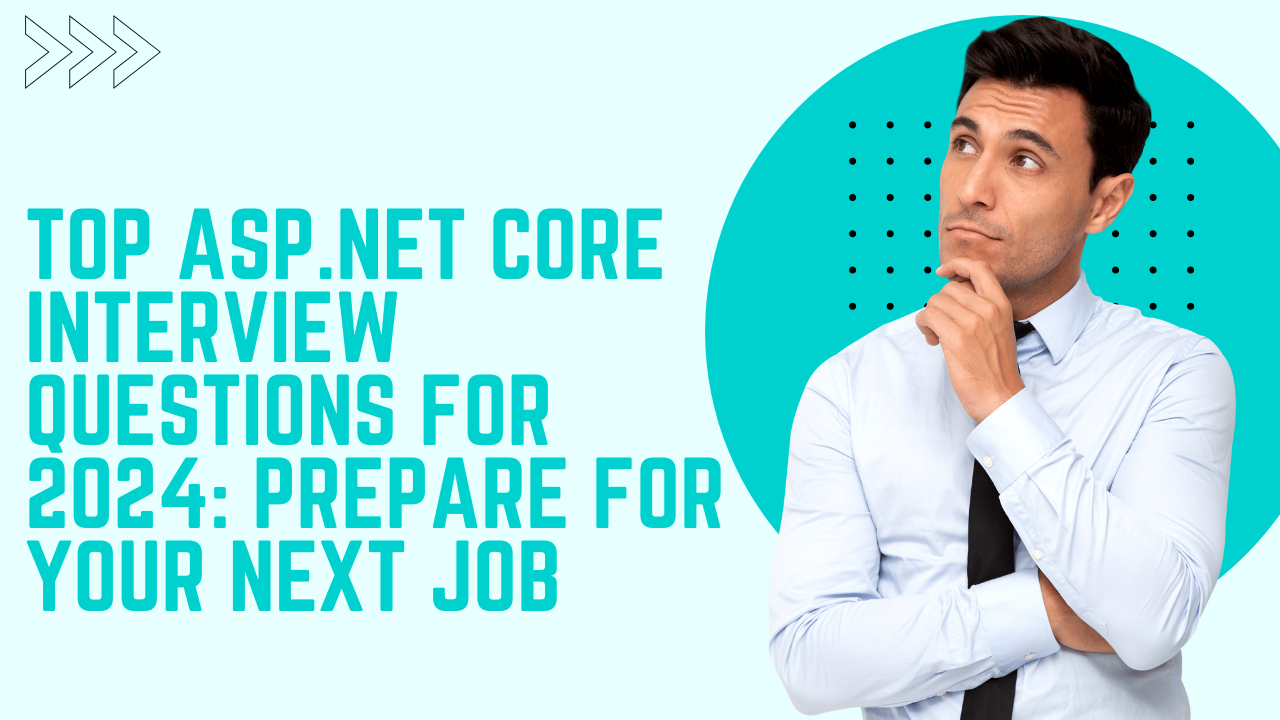In the ever-evolving landscape of technology, preparing for an interview can feel like a daunting task, especially for roles involving ASP.NET Core. Whether you’re a seasoned developer or just starting, understanding the core concepts is crucial for success. In this article, we’ll explore the top ASP.NET Core interview questions for 2024, helping you gear up for your next job opportunity. We’ll also touch on important concepts like the Startup Class In ASP.NET Core, which is fundamental for configuring applications.
If you’re curious about the financial aspects, don’t forget to check the .net developer salary to understand the market trends and compensation in your field. Now, let’s dive into the essential interview questions!
Understanding ASP.NET Core
ASP.NET Core is an open-source, cross-platform framework for building modern, cloud-based applications. It’s widely used due to its flexibility and performance, and it continues to evolve, making it crucial for developers to stay updated. In preparing for your interview, it’s vital to understand its architecture, key components, and best practices.
What is ASP.NET Core?
ASP.NET Core is a redesign of the previous ASP.NET framework, focusing on simplicity and performance. It supports various programming languages and is adaptable to different operating systems. Being a .NET developer, familiarity with ASP.NET Core can set you apart in the job market.
Why Should You Prepare for ASP.NET Core Interview Questions?
- Job Market Demand: As businesses shift towards digital solutions, the demand for skilled ASP.NET Core developers is rising.
- Framework Versatility: The versatility of ASP.NET Core means it’s used in various applications, from web services to enterprise solutions.
- Performance Optimization: Understanding how to optimize performance in ASP.NET Core applications can significantly impact your employability.
Key ASP.NET Core Interview Questions
Now that you understand the framework’s importance, let’s get into the questions that are likely to pop up in your interview.
1. What is the Startup Class in ASP.NET Core?
This question is fundamental. The Startup Class In ASP.NET Core is where you configure your application’s services and request handling pipeline. The ConfigureServices method is where you register services, while the Configure method is used to define how the application responds to HTTP requests.
2. How does Dependency Injection work in ASP.NET Core?
Dependency Injection (DI) is a core concept in ASP.NET Core. It allows developers to decouple their code, making it more maintainable and testable. ASP.NET Core comes with built-in support for DI, which is configured in the Startup class.
3. Can you explain Middleware in ASP.NET Core?
Middleware are components in the ASP.NET Core pipeline that process requests and responses. They can perform various tasks such as authentication, logging, and exception handling. Each middleware component can either pass the request to the next component or terminate the request.
4. What is the difference between ASP.NET Core and ASP.NET MVC?
While both frameworks are used for web application development, ASP.NET Core is a complete rewrite of ASP.NET MVC with significant improvements. ASP.NET Core is cross-platform, has better performance, and offers more flexibility in terms of deployment and hosting options.
5. How do you implement authentication in ASP.NET Core?
ASP.NET Core provides various authentication mechanisms, including Cookie Authentication, JWT Bearer Tokens, and External Providers (like Google and Facebook). You typically configure authentication in the ConfigureServices method of the Startup Class In ASP.NET Core.
6. What are Razor Pages in ASP.NET Core?
Razor Pages is a feature of ASP.NET Core that makes coding page-focused scenarios easier and more productive. Each page can have its own model, and it promotes a cleaner separation of concerns.
7. How do you handle exceptions in ASP.NET Core?
You can handle exceptions globally in ASP.NET Core using middleware. The UseExceptionHandler middleware can catch exceptions and redirect users to an error page, ensuring a smoother user experience.
8. What is Kestrel in ASP.NET Core?
Kestrel is the cross-platform web server for ASP.NET Core applications. It is lightweight, fast, and capable of handling a large number of concurrent requests, making it a popular choice for hosting ASP.NET Core applications.
9. Explain the role of appsettings.json.
The appsettings.json file is used for configuration settings in ASP.NET Core applications. It allows developers to store application settings in a structured format, which can be easily accessed throughout the application.
10. How do you set up logging in ASP.NET Core?
ASP.NET Core has built-in logging capabilities that support various logging providers. You can configure logging in the ConfigureServices method of the Startup Class In ASP.NET Core and control the log levels based on your application’s needs.
Preparing for Your Interview
Study Resources
- Official Documentation: The Microsoft Documentation is an excellent resource for understanding the framework’s components.
- Online Courses: Platforms like Udemy and Pluralsight offer comprehensive courses on ASP.NET Core.
- Community Forums: Engage with communities on platforms like Stack Overflow or Reddit to gain insights from experienced developers.
Mock Interviews
Conducting mock interviews can help you practice your responses and improve your confidence. Consider asking a friend to quiz you on these top ASP.NET Core interview questions for 2024, or use online platforms that offer mock interview sessions.
Real-World Projects
Nothing beats hands-on experience. Work on personal or open-source projects using ASP.NET Core. This practical experience not only solidifies your understanding but also provides valuable material to discuss during interviews.
Conclusion
Preparing for an interview in ASP.NET Core can be a rewarding journey if you approach it systematically. By familiarizing yourself with the top ASP.NET Core interview questions for 2024 and understanding concepts like the Startup Class In ASP.NET Core, you’ll be well-equipped to showcase your knowledge and skills.
Remember to keep your resume updated and research the .net developer salary trends to negotiate effectively. Good luck with your job search, and may your next interview lead you to exciting opportunities!
FAQ:
Q1: What is the average salary for a .NET developer in 2024?
The average .net developer salary in 2024 can vary significantly based on experience, location, and company size. However, many developers report salaries ranging from $80,000 to $120,000 annually, depending on these factors.
Q2: Is ASP.NET Core difficult to learn?
Learning ASP.NET Core can be challenging, especially if you are new to programming. However, with consistent practice and leveraging available resources, many find it easier than traditional ASP.NET due to its simplified architecture.
Q3: How do I deploy an ASP.NET Core application?
ASP.NET Core applications can be deployed in various ways, including cloud platforms like Azure, containerization with Docker, or traditional web hosting services. The deployment method often depends on the project requirements and team preferences.
Q4: What are the advantages of using ASP.NET Core?
ASP.NET Core offers numerous advantages, such as high performance, cross-platform capabilities, and a modular architecture. These features make it suitable for a wide range of applications, from small websites to large-scale enterprise solutions.
Q5: How can I improve my ASP.NET Core skills?
To improve your ASP.NET Core skills, engage in continuous learning through online courses, reading relevant books, contributing to open-source projects, and participating in community discussions. Practical experience is essential for mastering the framework.



